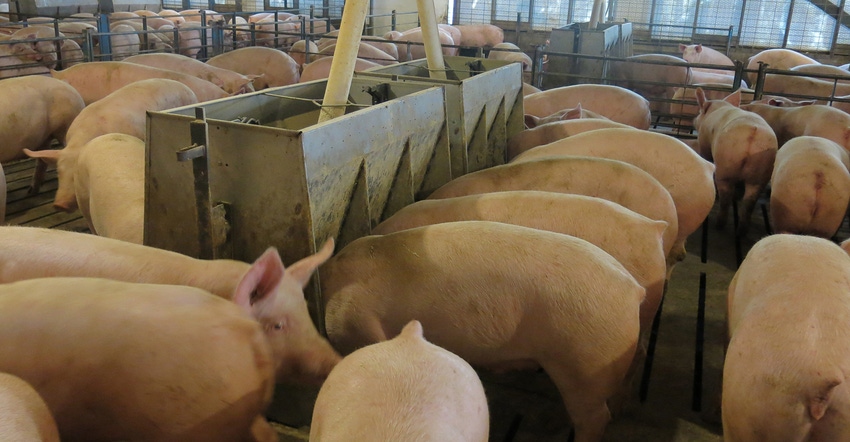High-protein DDGS provide high-quality nutrition
Three experiments confirm DDGS product has greater amino acid digestibility and contains more metabolizable energy than de-oiled DDGS.
July 24, 2020

With more ethanol in production and a greater ability to upcycle co-products into animal feed ingredients, companies are creating custom products and partnering with University of Illinois researchers to test for quality and digestibility.
In a recent study published in the Journal of Animal Science, Illinois researchers show a new high-protein distillers dried grains with solubles product from Marquis Energy has greater energy and protein digestibility than conventional DDGS.
"We've never seen a corn co-product with such a high energy concentration or amino acid digestibility," says Hans H. Stein, professor in the Department of Animal Sciences at Illinois and co-author on the study. "It's clearly a high-value product."
The product, branded ProCap DDGS, contains 48% crude protein, far higher than conventional de-oiled DDGS, which the research team evaluated at 31% in a nutrient analysis of each ingredient. ProCap DDGS also provided approximately 1,200 kilocalories per kilogram of metabolizable energy more than conventional DDGS, according to the analysis.
The study consisted of three experiments. In the first, the researchers evaluated the apparent and standardized ileal digestibility of crude protein and amino acids in three diets: ProCap DDGS, conventional de-oiled DDGS (also from Marquis Energy) and a nitrogen-free diet used to determine endogenous losses of amino acids and crude protein. Vitamins and minerals were added to each diet to meet or exceed dietary requirements. The researchers fed each diet to nine growing pigs for six days at three times the maintenance energy requirement.
On the fifth and sixth days, researchers collected ileal digesta and analyzed dry matter, crude protein and amino acids. As suggested by their nutrient analysis of the raw products, the researchers found the ProCap DDGS contained more crude protein and amino acids than de-oiled DDGS, and the standardized ileal digestibility of nearly all amino acids was greater in ProCap DDGS.
The second experiment focused on energy digestibility. In this case, the researchers evaluated three diets: corn, corn plus ProCap DDGS, and corn plus de-oiled DDGS. Again, all diets were supplemented with vitamins and minerals as needed. The team fed each diet to 24 growing barrows for 13 days at 3.2 times the maintenance energy requirement. Researchers calculated digestible energy and metabolizable energy values for all diets by collecting feces and urine over a four-day period during the experiment.
"If you look at the energy, which is of very high value for producers, and you compare with corn, we had much greater energy concentration in the ProCap DDGS, whereas conventional DDGS was lower than corn," Stein says.
The third experiment evaluated phosphorous digestibility. Researchers fed 32 barrows ProCap DDGS and de-oiled DDGS with or without microbial phytase. The pigs consumed these diets, along with supplemental vitamins and minerals (except phosphorus and calcium), for 13 days. Researchers collected feces from Day six to Day 12, and found that phytase plus ProCap DDGS increased the digestibility of phosphorus. However, without phytase, phosphorus digestibility of ProCap DDGS was lower than de-oiled DDGS.
The three experiments confirm ProCap DDGS has greater amino acid digestibility and contains more metabolizable energy than de-oiled DDGS, but has reduced phosphorus digestibility.
"The ethanol industry is clearly moving toward trying to separate the different streams that come out after fermentation so they can identify high-value, high-quality products. I think we'll see even more innovation and new feed ingredients in the future thanks to more advanced technologies in ethanol plants," Stein says.
The article, "A new source of high-protein distillers dried grains with solubles has greater digestibility of amino acids and energy, but less digestibility of phosphorus, than de-oiled DDGS when fed to growing pigs," is published in the Journal of Animal Science. Authors include Minoy Cristobal, Jessica Acosta, Su A. Lee and Stein. The research was supported by Marquis Energy. The Department of Animal Sciences is in the College of Agricultural, Consumer and Environmental Sciences at the University of Illinois.
Source: University of Illinois College of Agricultural, Consumer and Environmental Sciences, which is solely responsible for the information provided, and wholly owns the information. Informa Business Media and all its subsidiaries are not responsible for any of the content contained in this information asset.
You May Also Like



